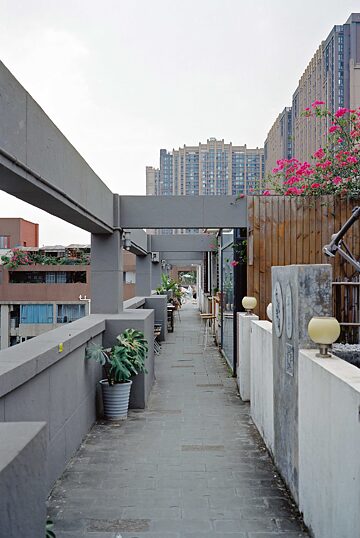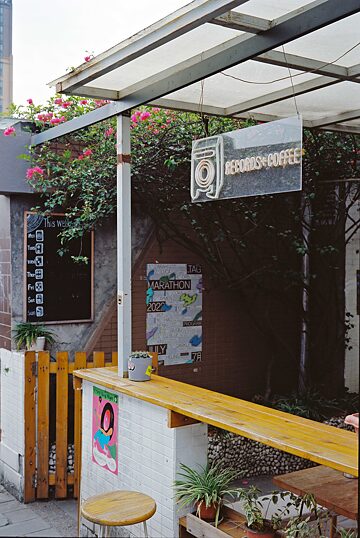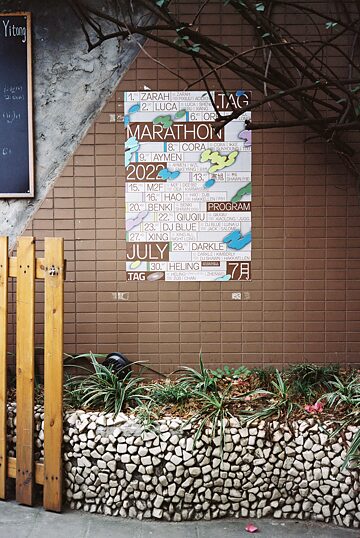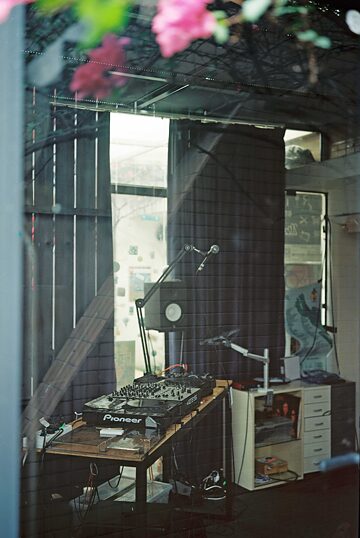Techno Culture in Chengdu Underground on the 21st floor
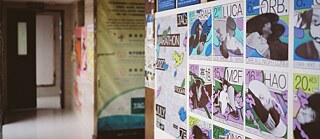
Entrance area from techno club .TAG | © yì magazìn
Berlin is the center of the international techno universe, Chengdu that of China. Roman Kierst dives into the underground scene of the metropolis in southwest China.
It’s easy to get past the first “bouncer”. The security man on the ground floor of this high-rise office building is engrossed in TikTok. I scan the QR code on the door with my Chinese covid app, which signals green – I’m good to go. Then I turn my phone around to show the security officer, but he’s not interested, things are all a bit more laid back here in southern China.Behind the door there’s a nondescript foyer, sheer marble walls and floors, the aroma of mass-cooked food hangs in the air – it’s lunchtime in the Chengdu Poly Center. Business as usual in this entirely ordinary foyer in this entirely ordinary Chinese office block, you might think – but this isn’t just any old lobby, it’s the gateway to the centre of the Chinese techno universe.
There are no signs and no other clear information – I need to know where I want to go. Turn left, then walk along a long corridor, at the end of which a small lift takes me to the 21st floor. At this point there’s an incredible view over the faintly smoggy street canyons of this megacity – and I soon feel as if I’ve landed somewhere completely different up here, experiencing a sensation of being far away from the hustle and bustle of society below, the constraints and requirements of day-to-day life in the aftermath of the pandemic. So it seems fitting that my destination up here, the techno club at the other end of the corridor, is called .TAG – which stands for To Another Galaxy.
The queer-friendly club is run by a woman and was founded in 2014. At the time it was one of many entertainment establishments in the commercial skyscraper known as baoli zhongxin 保利中心 , or more simply the Poly Center. But now .TAG is the last remaining club, and it’s famous far beyond the boundaries of the city for events such as the multi-day raves in celebration of the Chinese New Year that attract techno heads from all over China year after year.
The .TAG club and its residents are not unknown outside China either, and the club became established as a popular Asian venue for international touring DJs, for instance the Herrensauna crew from Berlin – before the pandemic. Héctor Oaks even released an acid banger entitled Just A Chengdu Dog on the Irish record label Earwiggle in 2019.
The pandemic led to closure of the borders, preventing international bookings at times, but the club on the 21st floor of the Poly Center continued to operate. Business was also good for local DJs, maybe even better than ever before. On the one hand they still have the .TAG residents from day one, such as Hao, who from the very start have shaped the club musically into what it is today, helped it grow into something big. But bit by bit, new DJs were also able to become part of the .TAG family, meaning that the club is now in a position to book up whole months at a time with local DJs, who can easily play long sets from midnight into the following morning.
There’s no doubt about what makes .TAG so special – the club itself with its two floors and a view across the city, the DJs and everyone else involved from door to bar, the surrounding community. But nowadays there are interesting clubs in other Chinese cities as well, not just in the metropolises of Beijing and Shanghai but also in cities that are less well-known on an international scale, like Shenzhen or Hangzhou.
However another factor makes the techno culture centred around the .TAG in Chengdu stand out above other cities, transporting visitors to a different techno galaxy by comparison – and that’s the structures that have grown up around this club and beyond it: a techno infrastructure that brings people together in association with this music genre, nurturing new talent and allowing the scene itself to flourish and evolve.
The techno triangle
An example of one important part of this techno infrastructure is on the top floor of the Soho Building just a few minutes’ walk from .TAG. Along a narrow open-air passageway with a view of the building’s inner courtyard, the Hakka Bar rubs shoulders with the Bianli DJ and music school, the Yitong record store, and finally Chengdu Community Radio.At places like the Hakka Bar or the Yitong record store, you can meet like-minded people, chat about music, cultivate contacts, forge friendships, and gain access to the scene. Yitong for instance hosts open deck nights during the week to offer new DJs an opportunity to have a go on the decks, to show what they can do. Those initial smaller bookings, such as the Hakka Bar or Chengdu Community Radio, might then become a stepping-stone to bigger dancefloors in Chengdu.
What hasn’t changed though is the sign next to the dancefloor bearing the self-deprecating statement wenming wuting 文明舞厅 in large illuminated letters, which means something along the lines of: only civilised partying is permitted here. And they party there as they ever did, the club gives local promoters and crews a chance to try out in a compact space with smaller events before venturing their luck in the bigger clubs.
One person who cut their teeth on these structures and feels right at home here – in fact maybe she is even a symbol of what’s possible thanks to these structures – is Luca.
I immediately spotted Luca’s good musical taste and her knack of picking a diverse selection of music at the 2019 New Year party in .TAG. Luca now performs regular DJ sets at big clubs all over China, and has released her first self-produced tracks.
From Ya’an to another galaxy
Luca originally comes from Ya’an in Sichuan. She discovered her love of music while still living at home, as both parents were involved with music professionally. “Back then my father was quite the trendsetter, so to speak,” Luca tells me via WeChat: “He wore leather gear, experimented with breakdancing, and even opened his own disco. Because of that we always had lots of CDs at home, many of which were European and American music, but also Chinese folk music, which he really liked.” Luca’s mother is a pre-school teacher and plays piano.Luca’s home city of Ya’an has a population of 1.4 million. “There’s a bit of action in the city itself, but overall it’s relatively isolated there. However I’m someone who enjoys discovering new things, and I started exploring the world beyond the confines of the city at an early stage – including through music. Back then I regularly bought Hit Music magazine, and I wrote down the bands that caught my interest to search for them on the internet afterwards. What I do now as a DJ isn’t so different to what I did as a child – I find music and share it with others.”
As a student, Luca happens to come across .TAG on Weibo, China’s equivalent to Twitter – and it piques her curiosity. “One weekend I headed for Chengdu to go to .TAG, I was quite shy when I was there and spent the whole evening sitting alone at the bar beside the dancefloor. I watched the DJs and the people closely, and was completely captivated by the emotions and energy in the room. In that moment I decided that I wanted to play music too.”
After that Luca looks for a mentor and becomes friends with Chengdu DJ Xiaolong, who helps her take those first steps. Three months later she gets her first gig in .TAG: “I practised a lot and I just got lucky, there was this open deck night in .TAG, and what I did there in terms of music was well-received by the people. You could really say that .TAG is like a sort of mother to me, having nourished and nurtured me like her new-born.”
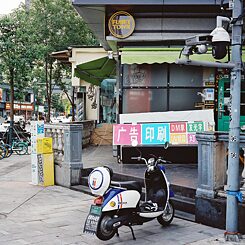 Funky Town in Chengdu
| © yì magazìn
Luca slowly gains a foothold on the scene thanks to the open deck night and some early gigs in .TAG. In 2017 she plays at one of the .TAG New Year parties for the first time and gradually finds her way into other Chengdu clubs, such as Funky Town. Looking back, she says: “Chengdu has had a diverse music scene over the years. Overall it’s a fairly tolerant, open and forward-looking environment, in which I was able to grow slowly and try out a variety of things. There’s constant exposure to new music and new stuff, and thanks to this inspiration you slowly find yourself and discover what you want to do.”
Funky Town in Chengdu
| © yì magazìn
Luca slowly gains a foothold on the scene thanks to the open deck night and some early gigs in .TAG. In 2017 she plays at one of the .TAG New Year parties for the first time and gradually finds her way into other Chengdu clubs, such as Funky Town. Looking back, she says: “Chengdu has had a diverse music scene over the years. Overall it’s a fairly tolerant, open and forward-looking environment, in which I was able to grow slowly and try out a variety of things. There’s constant exposure to new music and new stuff, and thanks to this inspiration you slowly find yourself and discover what you want to do.”Luca soon becomes interested in production, and in 2017 she takes an online course to support her wish. “I learned with this video tutorial, Ableton Live. I took it really seriously and I even started to produce stuff, but I never really got the hang of using the potential offered by the software to transform all my musical ideas into proper tracks.”
Following that, Luca takes lessons from Mao Mao alias Heling at Bianli DJ and Music School. The former rock guitarist is now a techno producer and DJ – and alongside his modular synthesisers one of his claims to fame is his long closing sets on the final day of the annual New Year rave in .TAG.
Luca releases her first track Genetic Storm in 2021 on a compilation by Chinese label Crater Records. The record with kick drum on the first and third beat and sparing use of other percussive elements starts and finishes with storm and wind sounds and reveals Luca’s musical influences – such as dark wave, ambient and electro, which can also be heard in her DJ sets. Playing records and making music are two sides of the same coin for Luca: “It’s all about expressing the hidden sides of my own personality. If I find that expression, use it to build an emotional bridge to others, create a connection, then I’m happy. Playing records and making music gives me energy, and I want to try and pass on this energy I have harnessed in the club too.”
Her second track Yun (“clouds”) is created in collaboration with a Chengdu restaurant. That’s very fitting for a DJ and producer from Chengdu, because this city is best known for its special culinary culture and diversity. The seven-minute ambient track with its peaceful piano melody stands out thanks to the field recordings throughout. “The recordings are from a vegetable market and farmyard in Yunnan,” explains Luca. This relationship with nature plays a major role for her, she spends a lot of her spare time outside and often goes climbing. “Just like music, that relationship with nature gives me an incredible amount of energy.”
In Chengdu everything seems to be interlinked: the diverse club scene with its small and large venues, the record store, the music school, self-organised internet radio and more. All this is the result of many years of work involving many people – who have persevered even under adverse circumstances.
But techno as a construct remains fragile in China, even in Chengdu. The Chinese zero-covid strategy, which has now been lifted, had triggered the immediate closure of all bars and clubs here too. What remains is an ongoing post-pandemic state that makes long-term planning impossible and has resulted in an existential threat to an increasing number of clubs and other culture venues.
So it’s even more pleasing to hear that this techno infrastructure, which is so special and worthy of protection, along with everything that’s emerging as a consequence, now seems to have really made its mark on an international scale and is even attracting interest in Berlin – from the centre of the Chinese techno universe to the centre of the international techno universe, you might say: .TAG resident Cora was the first DJ from Chengdu to play at Berghain in Berlin on 30th July 2022.
